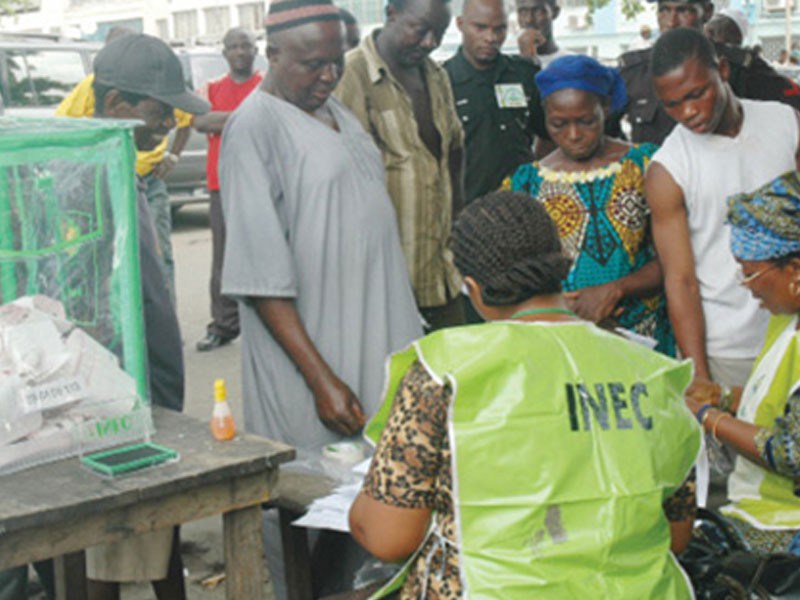Feature/OPED
Nigerian Elections: A Democratic Deficit

By Omoshola Deji
First Osun, then Kano and now Kogi and Bayelsa States. The spate of violence during election brings doubt on Nigeria’s ability to get it right. Unlike other nations, Nigeria seems to have no magic formula; no means of solving a problem without creating another.
Democracy initially seemed an opportunity to annihilate tyranny, but has instead increased it. Rule of law, freedom of speech and other democratic ethics are consistently being violated by the ruling elites and “converted democrat”. Nigeria is fast becoming the worst country for democracy as franchise have become an object of attack. This piece appraises the flaws of Nigerian elections, particularly the Kogi and Bayelsa governorship poll, and the pundit’s verdict.
The people of Kogi and Bayelsa trooped out on November 16 to elect their choice for the state’s top job. The exercise which should ordinarily be civil and peaceful was marred by unprecedented violence and electoral fraud. Gun-wielding thugs, aided by the security agencies, disrupted the electoral process from which Nigeria’s democracy is supposed to grow.
Perhaps those in positions of authority misconstrued duty as favour. In a democracy, individuals are morally responsible to vote their conscience, and government is duty-bound to provide the enabling environment, ensuring the wish of the majority prevails. Once the environment is not enabling, the outcome of an important exercise such as election cannot be taken as the wish of the majority. Factoring this in, although Yahaya Bello of Kogi state and David Lyon of Bayelsa were return elected, they did not win the election. This by no means underestimate their ability to win in a credible contest.
Repression of opposition candidates, their supporters and polling agents made the elections a democratic deficit. In Kogi state, incumbent Governor Yahaya Bello of the All Progressives Congress (APC) commanded violence on his contenders. Stalwarts of the People’s Democratic Party (PDP) and Social Democratic Party (SDP) were routinely harassed, injured and killed. Thugs invaded their homes, vandalized them, and set some ablaze. Several cars and valuables were destroyed, forcing the targets to go into hiding. This destabilized PDP and SDP from making last minutes canvassing to woo undecided voters; giving APC an unfair advantage. The attack surprisingly continued even after APC ‘won’. Thugs set the home of a PDP women leader ablaze and callously watch her burn to ashes.
Suppression of voters is also one of the unholy strategies APC employed. The party carefully studied the voting pattern of both states, ignite violence in opposition strongholds, but protected hers. In Kogi, election proceeded smoothly in the Central district where Bello hails from, while the East and West were confronted with extreme violence. In Bayelsa, people were restrained from voting in Southern Ijaw where PDP is likely to garner majority vote. The party was also stifled in Nembe. The outturn of both elections suggests APC has devised different illicit strategies for winning elections. Repression and suppression are autocratic tenets, a breach of the fundamental principle of fairness that must be adhered to in a democracy.
Disenfranchisement made the elections a democratic deficit. Violence and intimidation denied eligible voters the opportunity to cast their ballot. Fear kept people indoor while majority of those who turned up scampered for safety as thugs attack opposition strongholds in Kogi. Many lost their votes via ballot-box snatching. In Bayelsa, the Youth Initiative for Advocacy, Growth & Advancement, popularly called YIAGA Africa reports that INEC announced falsified results and election did not hold in 24 percent of the state’s polling units. Disenfranchising such a significant percentage of the population utterly discredits the outcome of the election. How do we pacify the 24 percent whose preferred candidates lost because they were denied the opportunity to vote? Such inequity makes the election a democratic deficit.
Monetary inducement of voters and electoral officers made the elections a democratic deficit. Agents of the dominant parties, particularly the APC and PDP always offer cash for votes, and did so in Kogi and Bayelsa states. They shared between N500 to N3000, although APC outspend the PDP, being the ruling party at the federal level.
Two categories of persons should be criticized for vote-buying, but Nigerians mostly condemn one; they blame the buyers (politicians) and absolve the sellers (voters). Vote-buying has become so prevalent that majority of the electorate expect to be tipped for voting. But then, should we blame the poor voters for demanding a continuation of what the parties started? Nonetheless, Nigerians need to be enlightened that politicians are descendants of the devil; they have no free gift. Vote-buying is a business and politicians who invest in the trade must recoup their money and make extraordinary profits, hence the prevalence of under-performing governments.
Electoral fraud and INEC’s partisanship made the elections a democratic deficit. An electoral umpire must be impartial to all contending parties, but INEC fell short. In Bayelsa, election materials stolen by APC thugs surfaced during collation and INEC allegedly record the votes. The umpire announced bogus results in favor of APC in Sagbama, Ogbia, Nembe, and Southern Ijaw. It’s baffling how these troubled spots returned high votes; the Borno 2015 template was apparently revived. How could the result of Nembe – a troubled spot where people would naturally abstain from voting – reflect over 80 percent turnout, while the result of a peaceful area such as Yenagoa, the state capital reflects less than 40 percent turnout? Such result is a clear indication of electoral fraud.
Electoral fraud was rife, but INEC lacks the courage to wield the big stick, especially against APC. In Kogi state, armed thugs, aided by the security agencies, manipulated the poll in favour of APC. Ballot boxes were either carted away, destroyed, or changed with already thumb-printed ones. To Nigerians dismay, INEC counted the false votes rather than cancel the results of the affected polling units. To top it all off, bogus figures were awarded in favour of APC in crisis-ridden areas and spaces PDP has fair support. For instance, INEC claimed APC scored 112,764 votes, while PDP only garnered 139 votes in Okene local government of Kogi State. This cannot be true.
A party with structure and spread like the PDP can’t garner such a paltry vote at a time Kogites were determined to sack Bello’s failed government. The bizarre result is a reflection of the extreme rigging perpetrated in almost every area of the state. In a credible contest, even SDP’s Akpoti would garner more than 139 votes in Okene. It is perturbing PDP didn’t score such a paltry vote during the Lagos 2019 governorship election. Please bear in mind that although the revenue generated in Lagos state is incommensurable with its rate of development, Akinwunmi Ambode’s administration performed much better than that of Bello in Kogi. Yet the godfather denied him return ticket, but supported Bello.
Unprofessional and partisan conduct of the security agencies made the elections a democratic deficit. Over 60,000 police officers and crime fighting equipment were deployed for the Bayelsa and Kogi governorship elections. Yet violence prevailed. The military compromised the election in Bayelsa, while police jeopardized the exercise in Kogi. Policemen accosted gun-wielding thugs to polling units across Kogi West and East district to snatch or stuff ballot boxes, attack opposition figures, and distribute money to APC agents. The thugs moved freely with vehicles despite restriction of movement, manipulating and destabilizing the election.
APC agents operated under massive protection while that of PDP and other opposition parties were left in the cold. Recall that prior to the election, candidate of the Social Democratic Party (SDP), Natasha Akpoti’s campaign office was looted and destroyed by alleged APC thugs, but the perpetrators weren’t arrested. Take a breather to imagine how the security agencies, the state government and the presidency would have reacted if such happens to any APC secretariat.
At the venue of the Peace Accord signing meeting, Akpoti and her aides were molested, her campaign vehicles were destroyed by APC thugs, while the police looked on. The raging thugs disrupted the meeting, which had several dignitaries present, including Mohammed Adamu, the Inspector General of Police (IGP). Yet none has been prosecuted. Take another breather to imagine how the IGP would have reacted if the thugs had no state’s backing.
The military’s massacre of Shiite members who obstructed the Chief of Army Staff’s convey should give you a clear sense of how the IGP would have probably reacted, if the thugs were not operating under the authority of the powers that be. However, subjecting the personality of the IGP to ridicule in a bid to win elections is a bad precedence with devastating consequences. Politicians need to desist from sacrificing the image and efficiency of national institutions on the altar of politics.
IGP Adamu stated that the policemen that colluded with thugs to disrupt the Kogi and Bayelsa elections were fake policemen. Nigerians are wondering how fake policemen, if any, overpowered the over 60,000 trained policemen deployed for the elections. Does it imply that fake policemen have better strategy and weapon than the real police? Assuming, but not conceding that fake policemen committed the anomalies, was the police helicopter that dropped canisters and opened fire on voters in PDP strongholds piloted by fake policemen? The IGP should come up with a better excuse or apologize for failing Nigerians.
Police announced making eleven arrests, but none were paraded. Many wonders why the same police that’s always eager to parade criminal suspects is reluctant to parade the electoral offenders. Besides, was it just the eleven persons arrested that perpetrated the extreme violence reported across the 21 local governments in Kogi state? It is most disheartening that the same police that couldn’t provide adequate security in just two states reigned terror on non-violent IPOB members, Shiite devotees and Revolution Now protesters.
INEC and the security agencies failed in every respect. Their inefficiencies significantly make Nigerian elections a democratic deficit. In Kogi and Bayelsa, electoral fraud prevailed despite INEC’s promise of a free, fair and credible election. Violence prevailed despite the deployment of over 60,000 police officers and crime fighting equipment such as armoured tanks and surveillance helicopters.
Vote-buying prevailed despite the deployment of officers of the Independent Corrupt Practices and other Related Offences Commission (ICPC) and the Economic and Financial Crimes Commission (EFCC). Both agencies made no arrest, despite extensive video evidences showing the face of vote buyers and sellers. Clandestine moves to disrupt the electoral process went undetected, and were freely perpetrated, despite the deployment of officers from the Department of State Security (DSS).
Election in Nigeria is one of the most expensive in the world, but far from being the most credible. No less than nine persons met their death during the Kogi and Bayelsa polls. A police officer, a youth corps member, Senator Dino Melaye’s nephew, and Kogi PDP women leader were among those unfortunate. APC needs to caution its members has the opposition parties lack federal might, a major instrument needed to perpetrate violence and electoral fraud.
Elections can’t be credible without the political will to make it happen. Nigerian government must put measures in place to forestall the use of illegal approaches to win elections. Such measures could include reducing the premium on political offices, signing the amended electoral bill into law, revamping the security architecture, and establishing an independent electoral offences commission.
Appraising the Pundit’s Verdict
It is habitual for the writer, hereafter titled Pundit, to foretell the outcome of elections. Notable among his several accurate predictions is foretelling ex-President Jonathan’s defeat in 2015. The Pundit foretold President Buhari’s re-election in 2019, against the prediction of reputable global institutions such as Williams and Associates, and The Economist. He also accurately foretold the outcome of the 2019 governorship election in 23 out of 29 states.
Despite his serial accurate predictions, the pundit’s prognosis of the elections in focus was not a totally good outing. Foreseen, but unprecedented violence and electoral fraud mainly forbid some of his predictions from coming to pass. In a piece titled “Kogi and Bayelsa 2019 Governorship Election: Foretelling the Outcome”, the Pundit predicted Duoye Diri’s (PDP) win in Bayelsa, but he lost. PDP’s Dino Melaye also failed to win the Kogi West senatorial rerun on the first vote as predicted. The election ended inconclusive. However, APC’s Yahaya Bello ‘won’ the Kogi governorship election as predicted, although not by rerun.
In truth, the pundit never saw APC’s win in Bayelsa coming. His prediction was mainly flawed by ex-president Jonathan’s secret endorsement of APC candidate, David Lyon. Although there were words on the street, the pundit believed Jonathan won’t work against his lifelong party, the PDP. This made him assert that “politics is an interest driven game; hence it is not impossible, but most unlikely that Jonathan would support APC. This is premised on the manner the party has disparaged him since he lost power in 2015.”
The pundit was wrong on Jonathan. He assumed the ex-president won’t support APC despite the dispute between him and Governor Seriake Dickson, his estranged godson. Jonathan acted like his erstwhile godfather, ex-president Olusegun Obasanjo. Despite unilaterally bringing Jonathan to power under the PDP, Obasanjo facilitated his defeat in 2015 by backing the APC. The party (APC) praised Obasanjo to high heavens, but abandoned him shortly after forming government. Jonathan’s romance with APC may also not end well. He may also get the Obasanjo treatment.
Another factor the pundit failed to consider during prediction is the (ex)militants endorsement of Lyon. Bayelsa is the den of dreaded militants who have the power to influence the outcome of elections. But then again, PDP has been governing Bayelsa since 1999, hence it is not amiss to think, in structure and strength, “PDP is in Bayelsa, what APC is in Lagos”. Moreover, the judicial invalidation of APC’s candidacy before the election naturally made winning an unattainable height, but the party pulled off a surprise.
INEC declared the Kogi West senatorial poll inconclusive with Smart Adeyemi (APC) leading Dino Melaye (PDP) with over 20,000 votes. As earlier discussed, the Kogi senatorial and governorship poll is a daylight robbery and fiery of public sovereignty. The pundit strongly stands by his prediction analysis and assertion that Melaye (PDP) would defeat Adeyemi (APC) in a free, fair and credible contest.
The pundit foretold Bello’s emergence as governor-elect in Kogi state based on his disposition to violence and electoral fraud. In the prediction piece, the pundit explicitly stated that “In a free, fair and credible contest, PDP’s Musa Wada would defeat APC’s Yahaya Bello. But the election is not going to be free; not going to be fair; and not going to be credible. Thugs would disperse voters and smash ballot boxes in Wada’s stronghold. The security agencies won’t arrest disruptors, and would be grossly partisan.” The lines came to pass exactly as foretold.
Nigerians never assumed Bello could bizarrely unleash violence on those he aspired to govern. The poor performing governor ingeniously took violence from the realm of creating inconclusive elections to straight win. His conduct ratifies the pundit’s argument that “he’s not deserving of governorship or any other position.” Bello’s insatiable thirst for power made him throw caution to the wind. He eventually got the power, but earned negative fame. The 44-year-old ruined his presidential prospect and wrote his name in the wrong page of history. Blessed is the one who defines Nigerian election as a process where thugs decide, police support, INEC declares, and the court affirm.
Omoshola Deji is a political and public affairs analyst. He wrote in via mo******@***oo.com
Feature/OPED
Gen Alpha: Africa’s Digital Architects, Not Your Target Audience

By Emma Kendrick Cox
This year, the eldest Gen Alpha turns 16.
That means they aren’t just the future of our work anymore. They are officially calling for a seat at the table, and they’ve brought their own chairs. And if you’re still calling this generation born between 2010 and 2025 the iPad generation, then I hate to break it to you, but you’re already obsolete. To the uninitiated, they look like a screen-addicted mystery. To those of us paying attention, they are the most sophisticated, commercially potent, and culturally fluent architects Africa has ever seen.
Why? Because Alphas were not born alongside the internet. They were born inside it. And by 2030, Africa will be home to one in every three Gen Alphas on the planet.
QWERTY the Dinosaur
We are witnessing the rise of a generation that writes via Siri and speech-to-text before they can even hold a pencil. With 63% of these kids navigating smartphones by age five, they don’t see a QWERTY keyboard as a tool. They see it as a speed bump, the long route, an inefficient use of their bandwidth. They don’t need to learn how to use tech because they were born with the ability to command their entire environment with a voice note or a swipe.
They are platform agnostic by instinct. They don’t see boundaries between devices. They’ll migrate from an Android phone to a Smart TV to an iPhone without breaking their stride. To them, the hardware is invisible…it’s the experience that matters.
They recognise brand identities long before they know the alphabet. I share a home with a peak Gen Alpha, age six and a half (don’t I dare forget that half). When she hears the ding-ding-ding-ding-ding of South Africa’s largest bank, Capitec’s POS machine, she calls it out instantly: “Mum! Someone just paid with Capitec!” It suddenly gives a whole new meaning to the theory of brand recall, in a case like this, extending it into a mental map of the financial world drawn long before Grade 2.
And it ultimately lands on this: This generation doesn’t want to just view your brand from behind a glass screen. They want to touch it, hear it, inhabit it, and remix it. If they can’t live inside your world, you’re literally just static.
The Uno Reverse card
Unlike any generation we’ve seen to date, households from Lagos to Joburg and beyond now see Alphas hold the ultimate Uno Reverse card on purchasing power. With 80% of parents admitting their kids dictate what the family buys, these Alphas are the unofficial CTOs and Procurement Officers of the home:
-
The hardware veto: Parents pay the bill, but Alphas pick the ISP based on Roblox latency and YouTube 4K buffers.
-
The Urban/Rural bridge: In the cities, they’re barking orders at Alexa. In rural areas, they are the ones translating tech for their families and narrowing the digital divide from the inside out.
-
The death of passive: I’ll fall on my sword when I say that with this generation, the word consumer is dead. It implies they just sit there and take what you give them, when, on the contrary, it is the total opposite. Alphas are Architectural. They are not going to buy your product unless they can co-author the experience from end to end.
As this generation creeps closer and closer to our bullseye, the team here at Irvine Partners has stopped looking at Gen Alpha as a demographic and started seeing them as the new infrastructure of the African market. They are mega-precise, fast, and surgically informed.
Believe me when I say they’ve already moved into your industry and started knocking down the walls. The only question is: are you building something they actually want to live in, or are you just a FaceTime call they are about to decline?
Pay attention. Big moves are coming. The architects are here.
Emma Kendrick Cox is an Executive Creative Director at Irvine Partners
Feature/OPED
Why Digital Trust Matters: Secure, Responsible AI for African SMEs?

By Kehinde Ogundare
For years, security for SMEs across sub-Saharan Africa meant metal grilles and alarm systems. Today, the most significant risks are invisible and growing faster than most businesses realise.
Artificial Intelligence has quietly embedded itself into everyday operations. The chatbot responding to customers at midnight, the system forecasting inventory requirements, and the software identifying unusual transactions are no longer experimental technologies. They are becoming standard features of modern business tools.
Last month’s observance of Safer Internet Day on February 10, themed ‘Smart tech, safe choices’, marked a pivotal moment. As AI adoption accelerates, the conversation must shift from whether businesses should use AI to how they deploy it responsibly. For SMEs across Africa, digital trust is no longer a technical consideration. It is a strategic business imperative.
The evolving threat landscape
Cybersecurity threats facing sub-Saharan African SMEs have moved well beyond basic phishing emails. Globally, cybercrime costs are projected to reach $10.5 trillion this year, fuelled by generative AI and increasingly sophisticated social engineering techniques. Ransomware attacks now paralyse entire operations, while other threats quietly extract sensitive customer data over extended periods.
The regional impact is equally significant. More than 70% of South African SMEs report experiencing at least one attempted cyberattack, and Nigeria faces an average of 3,759 cyberattacks per week on its businesses. Kenya recorded 2.54 billion cyber threat incidents in the first quarter of 2025 alone, whilst Africa loses approximately 10% of its GDP to cyberattacks annually.
The hidden risk of fragmentation
A common but often overlooked vulnerability lies in digital fragmentation.
In the early stages of growth, SMEs understandably prioritise affordability and agility. Over time, this can result in a patchwork of disconnected applications, each with separate logins, security standards, and privacy policies. What begins as flexibility can involve operational complexity.
According to IBM Security’s Cost of a Data Breach Report, companies with highly fragmented security environments experienced average breach costs of $4.88 million in 2024.
Fragmented systems create blind spots; each additional data transfer between applications increases exposure. Inconsistent security protocols make governance harder to enforce. Limited visibility reduces the ability to detect anomalies early. In practical terms, complexity increases risk.
Privacy-first AI as a competitive differentiator
As AI capabilities become embedded in business software, SMEs face a choice about how they approach these powerful tools. The risks are not merely theoretical.
Consumers across Africa are becoming more aware of data rights and are willing to walk away from businesses that cannot demonstrate trustworthiness. According to KPMG’s Trust in AI report, approximately 70% of adults do not trust companies to use AI responsibly, and 81% expect misuse. Meanwhile, studies also show that 71% of consumers would stop doing business with a company that mishandles information.
Trust, once lost, is difficult to rebuild. In the digital age, a single data leak can destroy a reputation that took ten years to build. When customers share their payment details or purchase history, they extend trust. How you handle that trust, particularly when AI processes their data, determines whether they return or take their business elsewhere.
Privacy-first, responsible AI design means building intelligence into business systems with data protection, transparency and ethical use embedded from the outset. It involves collecting only necessary information, storing it securely, being transparent about how AI makes decisions, and ensuring algorithms work without compromising customer privacy. For SMEs, this might mean choosing inventory software where predictive AI runs on your own data without sending it externally, or customer service platforms that analyse patterns without exposing individual records. When AI is built responsibly into unified platforms, it becomes a competitive advantage: you gain operational efficiency whilst demonstrating that customer data is protected, not exploited.
Unified platforms and operational resilience
The solution lies in rethinking digital infrastructure. Rather than accumulating disparate tools, businesses need unified platforms that integrate core functions whilst maintaining consistent security protocols.
A unified approach means choosing cloud-based platforms where functions share common security standards, and data flows seamlessly. For a manufacturing SME, this means inventory management, order processing and financial reporting operate within a single security framework.
When everything operates cohesively, security gaps diminish, and the attack surface shrinks. And the benefits extend beyond risk reduction: employees spend less time on administrative friction, customer data stays consistent, and platforms enable secure collaboration without traditional infrastructure costs.
Safer Internet Day reminds us that the digital world requires active stewardship. For SMEs across the African continent who are navigating complex threats whilst harnessing AI’s potential, digital trust is foundational to sustainable growth. Security, privacy and responsible AI are essential characteristics of any technology infrastructure worth building upon. Businesses that embrace unified, privacy-first platforms will be more resilient against cyber threats and better positioned to earn and maintain trust. In a market where trust is currency, that advantage is everything.
Kehinde Ogundare is the Country Head for Zoho Nigeria
Feature/OPED
Iran-Israel-US Conflict and CBN’s FX Gains: A Stress Test for Nigeria’s Monetary Stability

By Blaise Udunze
At the 304th policy meeting held on Wednesday, the 25th February, the Central Bank of Nigeria’s (CBN) Monetary Policy Committee cut the rate by 50 basis points to 26.5 per cent from 27 per cent, which has been widely described as a cautious transition from prolonged tightening to calibrated easing. The CBN stated that the decision followed 11 consecutive months of disinflation. The economy witnessed headline inflation easing to 15.10 per cent in January 2026, and food inflation falling sharply to 8.89 per cent. Foreign reserves are climbing to $50.45 billion, their highest level in 13 years. The Purchasing Managers’ Index is holding at an expansionary 55.7 points.
As reported in the paper, no doubt that the macroeconomic narrative appears encouraging. On a closer scrutiny, the sustainability of these gains is now being tested by forces far beyond the apex bank’s policy corridors. This is as a result of the clear, direct ripple effect of the escalating conflict between Iran and Israel, with direct military involvement from the United States, which has triggered one of the most significant geopolitical energy shocks in decades. For Nigeria, the timing is delicate. Just as the CBN signals confidence in disinflation and stability, global volatility threatens to complicate and possibly distort its monetary path.
The rate cut, though welcomed by many analysts, must be understood in context. Nigeria remains in an exceptionally high-rate environment. An MPR of 26.5 per cent is still restrictive by any standard. The Cash Reserve Ratio (CRR) remains elevated at 45 per cent for commercial banks, and this effectively sterilises nearly half of deposits, while liquidity ratios are tight, and lending rates to businesses often exceed 30 per cent once risk premiums are included. The adjustment is therefore incremental, not transformational.
The Director/CEO of the Centre for the Promotion of Private Enterprise (CPPE), Dr. Muda Yusuf, has repeatedly noted that Nigeria’s deeper challenge lies in weak monetary transmission. According to him, even when the benchmark rate falls, structural rigidities, high CRR, elevated deposit costs, macroeconomic uncertainty, and crowding-out from government borrowing prevent meaningful relief from reaching manufacturers, SMEs, agriculture, and other productive sectors. Monetary easing, without structural reform, risks becoming cosmetic. The point is that even before structural reforms take effect, the fact is that an external shock will first reshape the landscape.
The Iran-Israel conflict and US involvement have reignited fears in global energy markets. Joint U.S. and Israeli strikes on Iranian targets and retaliatory missile exchanges across the Gulf have unsettled oil traders. Brent crude, already rising in anticipation of escalation, surged toward $70-$75 per barrel and could climb higher if shipping through the Strait of Hormuz, through which nearly 20 per cent of global oil supplies pass, faces disruption. It is still an irony that a major crude exporter is also an importer of refined petroleum products.
Higher crude prices offer a theoretical windfall. For Nigeria’s economy, it is well known that oil remains its largest source of foreign exchange and accounts for roughly 50 per cent of government revenue. The good thing is that rising prices could boost reserves, improve forex liquidity, strengthen the naira, and ease fiscal pressures. In theory, this external cushion could support macroeconomic stability and reinforce the CBN’s easing posture.
However, the upside is constrained by structural weaknesses. Nigeria’s oil production remains below optimal capacity. A significant portion of crude exports is tied to long-term contracts, limiting immediate gains from spot price surges. As SB Morgen observed in its analysis, Nigeria’s “windfall” is volatile and limited by soft production performance.
More critically, Nigeria’s dependence on imported refined products exposes it to imported inflation. Rising global crude prices increase the cost of petrol, diesel, jet fuel and gas. With fuel subsidies removed, these increases are passed directly to consumers and businesses. Depot pump prices have already adjusted upward amid Middle East tensions.
Energy costs are a primary driver of Nigeria’s inflation, and this has remained sacrosanct. When fuel prices rise, transportation, logistics, food distribution, power generation, and manufacturing costs will definitely skyrocket, as well as the inflationary impulse spreads quickly through the economy. This will push households to face higher food and transportation costs. Businesses see shrinking margins. Real incomes erode.
Thus, the same oil shock that boosts government revenue may simultaneously reignite inflationary pressure, precisely at a moment when the CBN has begun cautiously easing policy.
This dynamic introduces a difficult policy dilemma, even as this could be for the fragile gains of the MPC. This is to say that if energy-driven inflation resurges, the CBN may be forced to pause or reverse its easing cycle. It is clearly spelt that high inflation typically compels tighter monetary conditions. As Yusuf warned, geopolitical headwinds that elevate inflation often push central banks toward higher interest rates. A renewed tightening would strain credit conditions further, undermining growth prospects.
There is also the risk of money supply expansion. Increased oil revenues, once monetised, can expand liquidity in the domestic system. Historically, surges in oil receipts have been associated with monetary growth, inflationary pressure, and exchange rate volatility. Without sterilisation discipline, a revenue boost could ironically destabilise macro fundamentals.
The exchange rate dimension compounds the complexity. Heightened geopolitical risk, just as it is currently playing out with the Iran-Israel conflict, often triggers global flight to safety. This will eventually lure investors to retreat to U.S. Treasuries and gold. Emerging markets face capital outflows. If it happens that foreign portfolio investors withdraw from Nigeria’s fixed-income market in response to global uncertainty, pressure on the naira could intensify.
Already, the CBN has demonstrated sensitivity to exchange rate dynamics by intervening to prevent excessive naira appreciation. A sharp rate cut in the midst of global volatility could destabilise carry trades and spur dollar demand. What should be known is that the 50-bps reduction reflects not just domestic disinflation, but global risk management such as geopolitical tensions, oil prices, and foreign investor sentiment.
Beyond macroeconomics, geopolitical implications carry security concerns. Analysts warn that a widening Middle East conflict could embolden extremist narratives across the Sahel and it directly has security consequences for Nigeria and the broader region. Groups such as Boko Haram and ISWAP may exploit anti-Western framing to recruit and mobilise more followers in the Sahel region, thereby giving the extremist groups new propaganda opportunities. The pebble fear is that a diversion of Western security resources away from West Africa could create regional vacuums. What the Nigerian economy will begin to experience is that security instability will disrupt agricultural output, logistics corridors, and investor confidence, feeding back into inflation and slow economic growth, and as ripple effects, the economy becomes weaker.
Nigeria’s diplomatic balancing act adds another layer of fragility because it is walking on a tactful tightrope. The country is trying not to upset anyone, but maintains cautious neutrality, urging restraint while preserving ties with Western allies and Middle Eastern partners. Yet rising tensions globally between major powers, including Russia and China, complicate the geopolitical chessboard. Invariably, this will have a direct impact as trade flows, remittances, and investment patterns may change unexpectedly, affecting Nigeria’s economy.
With the current conflict in the Middle East, the prospects for economic growth also face renewed strain or are under increased pressure. The stock markets in developed countries have been fluctuating a lot because people are worried that there will be problems with the energy supply. If the whole world does not grow fast, then people will use less oil over time. This means that the good things that happen to Nigeria because of oil prices will probably not last, and any extra money Nigeria gets from oil prices now will be lost. Nigeria will not get to keep the money from high oil prices for a long time. The oil prices will affect Nigeria. Then the effect will go away. One clear thing is that since Nigeria relies heavily on oil exports, this commodity dependence exposes the country to significant risk.
Meanwhile, Nigeria’s domestic fundamentals remain structurally challenged. The recapitalisation of banks, with 20 of 33 institutions meeting new capital thresholds, strengthens resilience, but does not guarantee credit expansion into productive sectors. Banks continue to prefer risk-free government securities over private lending in uncertain environments.
Fiscal discipline remains essential. Elevated debt service obligations absorb substantial revenue. Election-related spending poses upside inflation risks. This understanding must be adhered to, that without credible deficit reduction and revenue diversification, monetary easing may be undermined by fiscal expansion.
At the moment, given the current global and domestic uncertainties, the 50 per cent interest cut rate appears less like a pivot toward growth and more like a signal of cautious optimism under conditional stability. The policy decision is based on several key expectations with the assumptions that disinflation will persist, exchange rate stability will hold, and global conditions will not deteriorate dramatically.
But the Iran-Israel-U.S. conflict introduces uncertainty into all three assumptions, which is wrongly perceived as behind the rate cut that inflation will keep coming down, that the exchange rate will stay stable, and global conditions won’t worsen, are all undermined by the unfolding conflict.
If the global oil prices rise sharply and fuel becomes more expensive locally, overall prices in the economy could increase again, which means inflation could accelerate. Another dangerous trend is that if foreign investors pull capital out of Nigeria, exchange rate stability could weaken, seeing the naira coming under pressure. If global growth slows, export earnings could decline. Each of these scenarios would constrain the CBN’s flexibility.
This is not to dismiss potential upsides. Higher oil prices, if production improves, could bolster reserves and moderate fiscal deficits. Forex liquidity could strengthen the naira. Investment in upstream oil and gas could gain momentum. Historically, crude price increases have correlated with improved GDP performance and stock market optimism in Nigeria.
Yet history also warns of volatility. A good example is during the 2022 Ukraine conflict, oil prices spiked above $100 per barrel, which created a potential revenue windfall for oil-exporting countries, but Nigeria struggled to translate that temporary advantage into sustained economic improvement. Inflation persisted. In the case of Nigeria, the deep-rooted systemic or structural weaknesses and inefficiency diluted the benefits that should have been gained.
The lesson is clear because temporary external windfalls or short-term luck cannot substitute for structural and deep internal economic reforms.
The point is that sustainable development demands diversification beyond oil, to strengthening multiple parts of its economy at the same time, such as improved refining capacity, infrastructure investment, agricultural security, logistics efficiency, and fiscal consolidation. Monetary policy, as the action taken by the CBN at the MPC meeting by adjusting interest rates or attempting to control money supply, can anchor expectations and moderate volatility, but it cannot build productive capacity; it will only help to reduce short-term economic swings.
The CBN’s decision to cut the interest rate appears cautious. It is not a bold shift but rather a small adjustment. This shows that the bank is being careful and optimistic about the economy. It also knows that there are still problems. The trouble in the Middle East, like the fighting that affects the oil supply, reminds the people in charge that Nigeria’s economy is closely tied to what happens with energy around the world. This includes things like inflation, the value of money, and how fast the economy grows.
Until structural reforms reduce dependence on volatile oil cycles and imported fuel, Nigeria’s monetary policy will remain reactive to external crises. To really make the economy strong and stable, Nigeria needs to make some changes. It requires resilience against geopolitical storms.
The MPC has taken a step. Whether it marks a turning point depends less on 50 basis points and more on how Nigeria navigates a world increasingly defined by conflict-driven volatility.
Blaise, a journalist and PR professional, writes from Lagos and can be reached via: bl***********@***il.com
-

 Feature/OPED6 years ago
Feature/OPED6 years agoDavos was Different this year
-
Travel/Tourism10 years ago
Lagos Seals Western Lodge Hotel In Ikorodu
-

 Showbiz3 years ago
Showbiz3 years agoEstranged Lover Releases Videos of Empress Njamah Bathing
-

 Banking8 years ago
Banking8 years agoSort Codes of GTBank Branches in Nigeria
-

 Economy3 years ago
Economy3 years agoSubsidy Removal: CNG at N130 Per Litre Cheaper Than Petrol—IPMAN
-

 Banking3 years ago
Banking3 years agoSort Codes of UBA Branches in Nigeria
-

 Banking3 years ago
Banking3 years agoFirst Bank Announces Planned Downtime
-

 Sports3 years ago
Sports3 years agoHighest Paid Nigerian Footballer – How Much Do Nigerian Footballers Earn












